The International Criminal Court: Is the “Child of Nuremberg” Universal?
In the first and second parts of this essay, we saw how W.E.B. Du Bois’ concept of the colour line helps explain the West’s license to commit war crimes and crimes against humanity, even as international law does not refrain from sentencing those outside Euro-America for their actions, often in the same wars. A legacy of the Tokyo trial, where Japanese atrocities in WWII were persecuted but not American ones, this practice in international law further cements a global colour line. Thus, in his book Judgement at Tokyo: World War II on Trial and the Making of Modern Asia (2023), Gary J. Bass places the trials within the context of colonialism, racism and the Cold War. The colonial gaze, which silences as much as it punishes, is evident in the scarce media representation of these trials, which remain largely limited to a four-and-a-half hour long Japanese documentary Tôkyô saiban (1983) by Masaki Kobayashi and a Chinese film The Tokyo Trial (2006) by Qunshu Gao from the perspective of the Chinese judge Justice Mei Ju-ao. The conspicuous absence (to the best of my knowledge) of Western representation of the trials reveals the significance of the visual documentation of South Africa’s ongoing genocide case against Israel at the International Court of Justice (ICJ), as evidence and as historical record.
 Documentary (Russian Version)..jpg)
The Nuremberg Trials, which tried the Nazis for war crimes, inaugurated international criminal law and formed the basis for international human rights. (Still from Nuremberg Trial, 1947.)
The impunity for Israel in the ongoing Nakba in Palestine and the refusal to persecute American officials for their crimes in Afghanistan are cases in point. This brings to bear the question: is Nuremberg a constitutive exception for persecuting the West for war crimes? Are human rights—as founded in the Nuremberg Trials, which then forms the basis for the 1948 Universal Declaration of Human Rights, the 1948 Genocide Convention and the 1949 Geneva Convention—reserved for the West? If people in the non-West do not have a claim to universal human rights, particularly when such claims involve a Western nation or its allies, are they not considered humans under international law?
 Documentary (Russian Version)..jpg)
Nazis shaved the heads of people in occupied territories to turn the hair into mattresses for commercial profit. (Still from Nuremberg Trial, 1947.)
Nuremberg Trials (1947) shows how the Nazis “even turned death into a commercial enterprise.” From the corpses of their victims,
“...they cut their hair from their scalps and sent it to Germany to be made into mattresses… They extracted soap from the dead bodies… Here is human skin dressed and tanned at the factory. From it, the Germans made gloves, ladies bags, briefcases. What manner of creatures are these then? Is there any punishment commensurable to their crimes?”
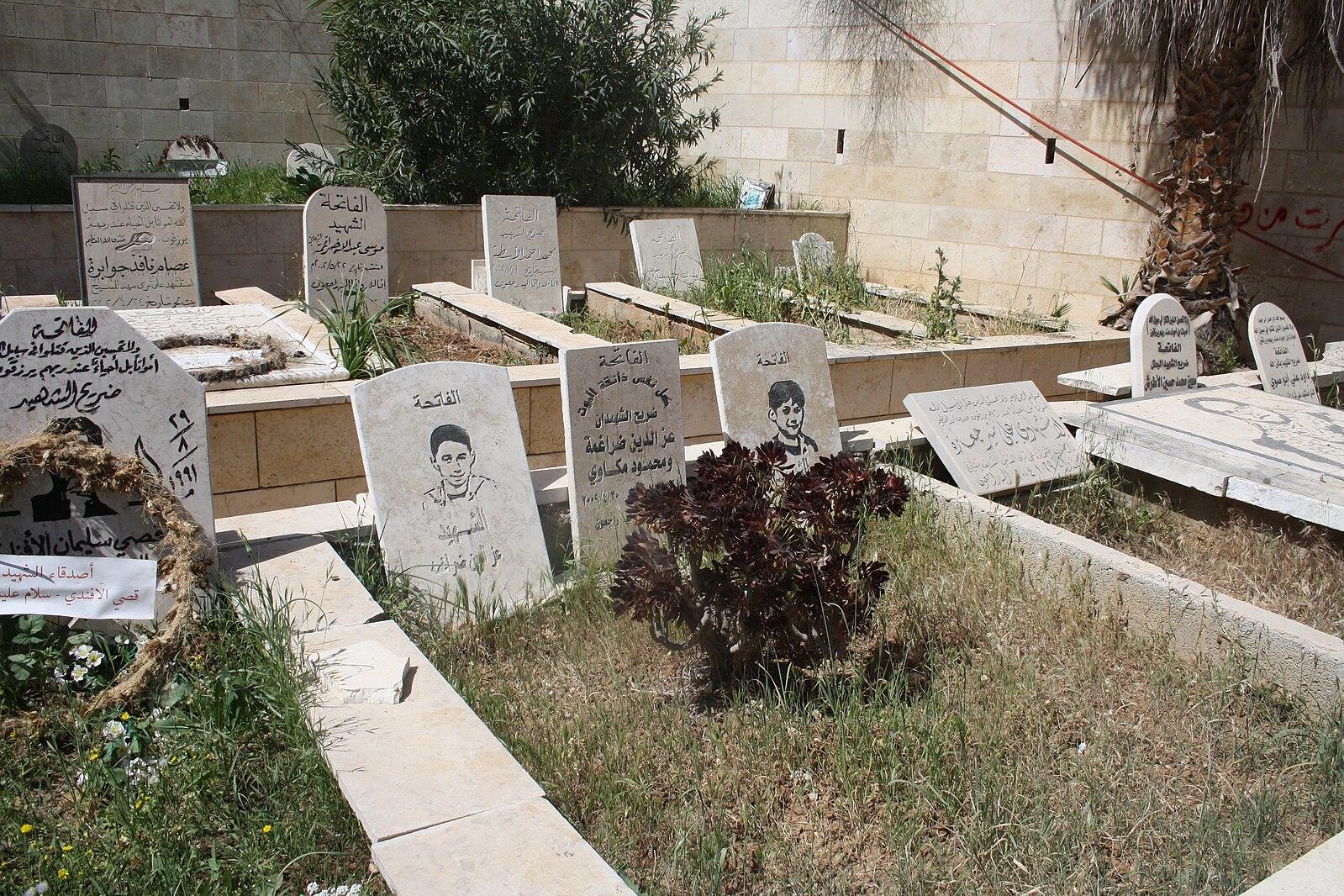
Graves of two Palestinian children shot by IDF forces. (Martyr Graveyard in Artas, West Bank Image credit: Wikimedia Commons.)
In similar fashion, Israel, considered to be the biggest hub for the illegal global trade in human organs as per a 2008 investigative report by CNN, commits organ theft from Palestinians’ dead bodies without the consent or knowledge of their families. Well documented, for instance, in Israeli doctor Meira Weiss’ book Over Their Dead Bodies (2014), it is also alleged that Israel’s skin bank takes skin from dead Palestinians and African workers to treat burn injuries of Israeli soldiers. Moreover, the infamous Cemeteries of Numbers, with secret graves holding dead Palestinian hostages in inaccessible military zones, are legalised by the Israeli Supreme Court.
Yet, if at Nuremberg, in response to the horrors against European Jews, the American prosecutor warned, “If these men (accused Nazi officials) are to be declared innocent, then there was no war, no massacres, and no crime,” the ongoing Nakba of Palestinian peoples continues to garner support from the West. This differential response to a genocide of Europeans and of Palestinians lay bare once again the colour line, begging the question—do the principles of Nuremberg apply to Palestinian life?
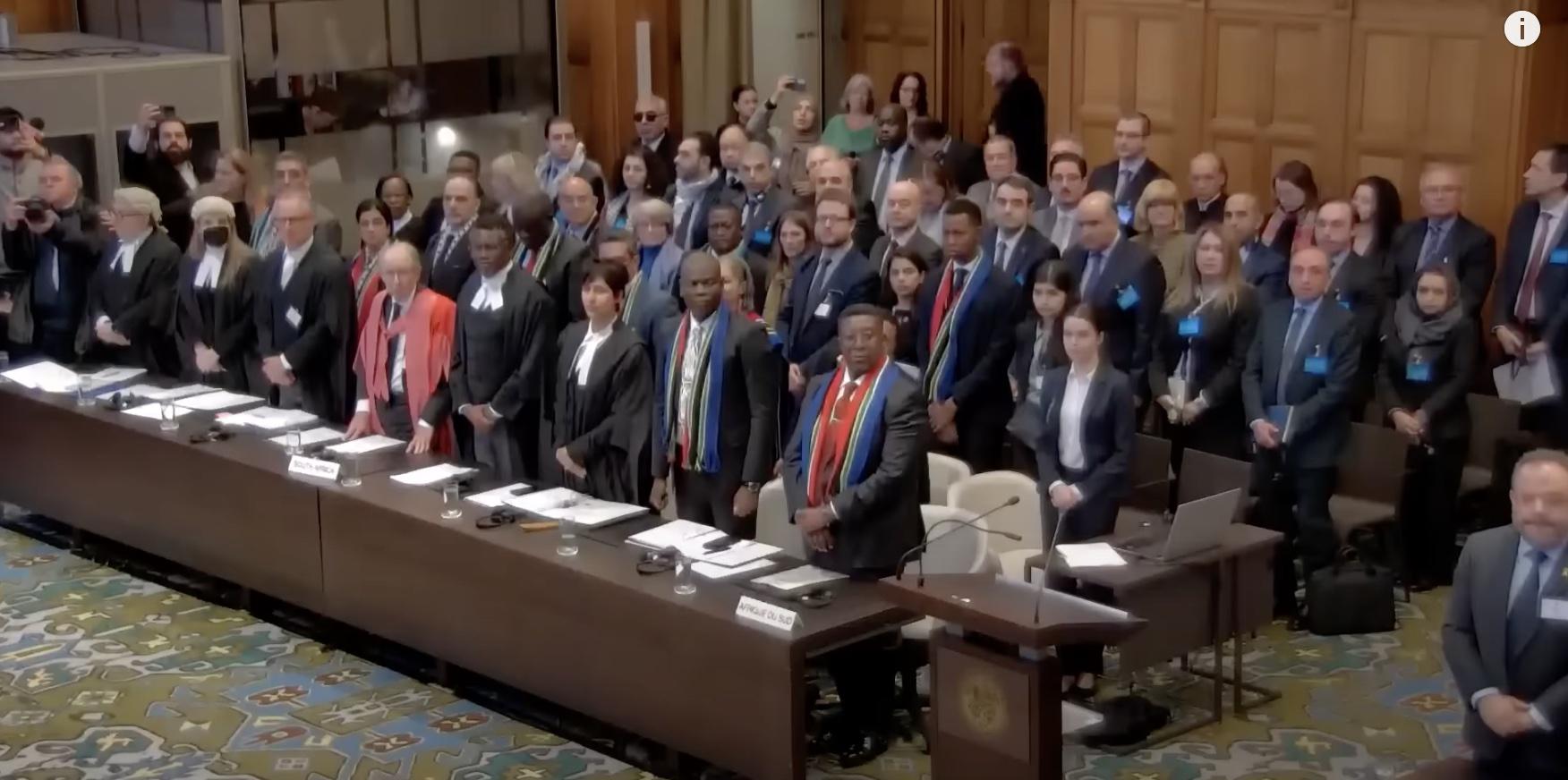
South Africa levels accusations of genocidal conduct against Israel at the UN International Court of Justice. Still from the live footage of the case, courtesy United Nations YouTube channel.
It was precisely in fidelity to the integrity of the Nuremberg principles and the subsequent 1948 Genocide Convention that South Africa presented to the ICJ a remarkable genocide case against Israel in January 2024, with a further appeal in May 2024 for the urgent issue of orders to Israel to halt its offensive in Rafah and preserve the foundation of Palestinian life.
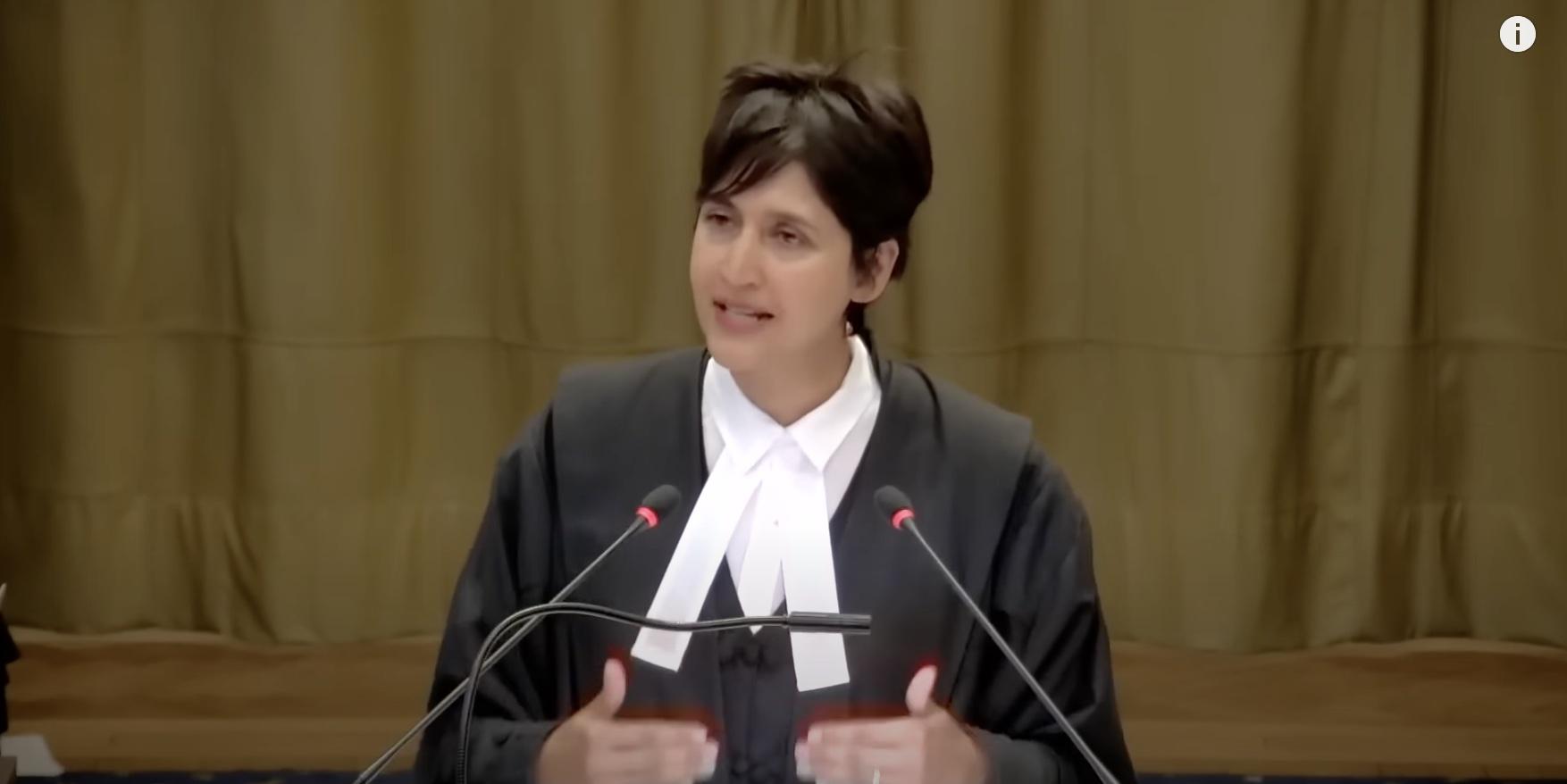
Senior Counsel Adila Hassim provides an overview of the risk of genocide in Palestine. Still from the live footage of the case, courtesy United Nations YouTube channel.
In a measured yet impassioned speech, senior counsel Adila Hassim invoked historical precedent in the Gambia Myanmar case to pursue the principle of equivalence, that the rule at issue be applied without distinction across cases. “This court did not hesitate to impose provisional measures in relation to allegations that Myanmar was committing genocidal acts against the Rohingya within the Rakhine State. The facts before the court today are sadly even more stark, and deserve and demand this court’s intervention.” International law does not hesitate to act in cases involving the non-West. However, the same laws do not seem to apply to the West and its allies.
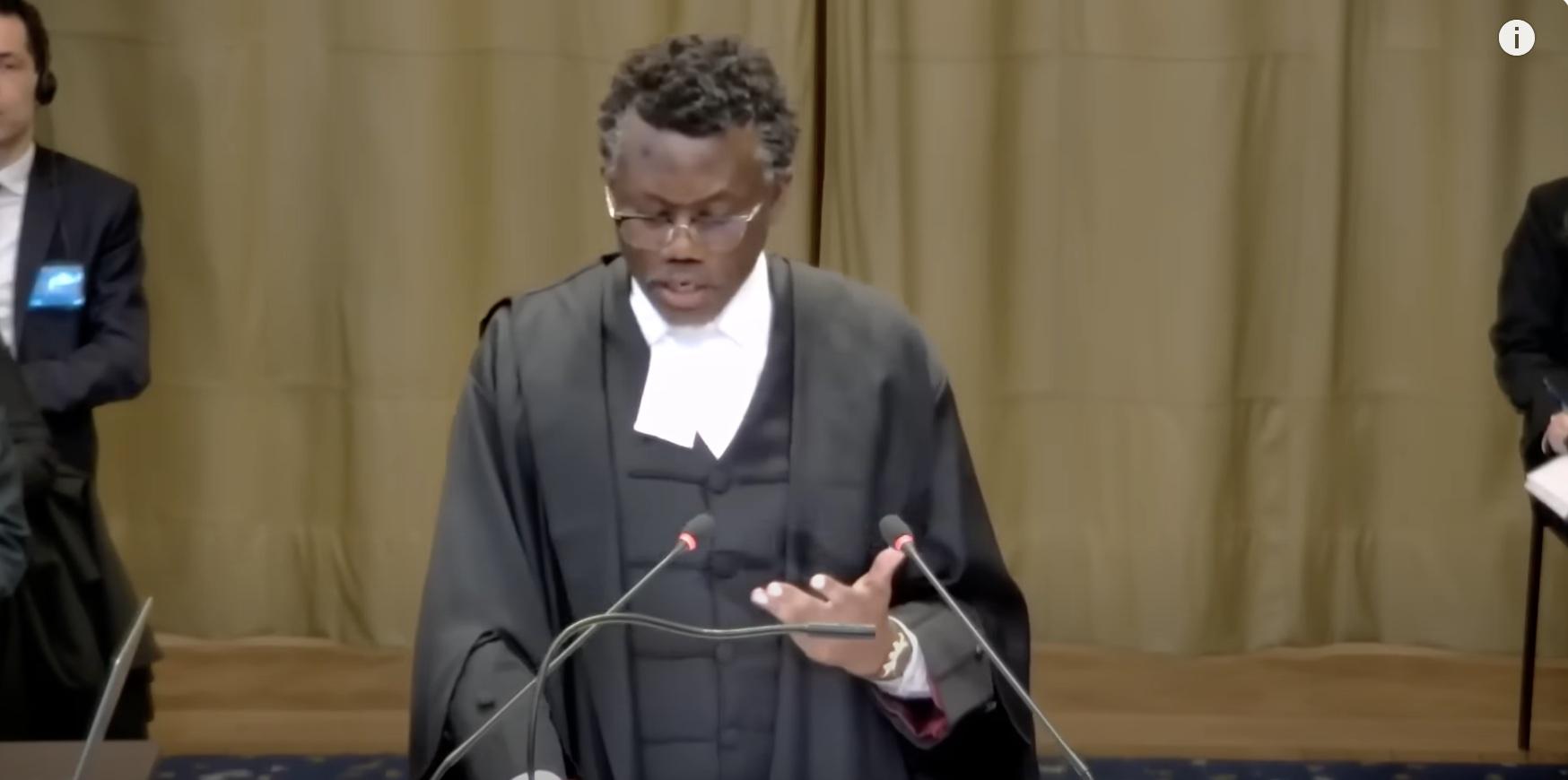
Advocate Tembeka Ngcukaitobi provides evidence of genocidal intent by Israel. Still from the live footage of the case, courtesy United Nations YouTube channel.
Thus, as Advocate Tembeka Ngcukaitobi iterates as evidence for Israel’s intent for genocide of Palestinians, “Deputy Speaker of the Israeli parliament called for erasure of the Gaza strip from the face of the earth.” Defence Minister Yoav Gallant’s orders were, “Israel is fighting human animals. We will eliminate everything; we will reach all places without restraint.”

Chief Prosecutor Karim Khan of the International Criminal Court makes an application to try key Israeli officials for war crimes. Image courtesy Wikimedia Commons.
In fact, the chief prosecutor of the International Criminal Court (ICC), Karim Khan, in relation to a recent application seeking the arrest warrants of Israeli Prime Minister Benjamin Netanyahu and Israeli Defence Minister Yoav Gallant, along with three Hamas leaders, made a rather explicit invocation of the colour line in response to a question on American criticism of the application:
“This court is a child of Nuremberg. It was built because of the awful pictures that haunt us today of the Shoah and the gas chambers… This is a moment when we see in the shadow of Ukraine an increased cacophony of noise of double standards and selectivity… Some elected leaders have been very blunt—'This court is built for Africa and for thugs like Putin’… We don’t view it like that.”
Khan continues to say, “This court should be the triumph of law over power and brute force, grab what you can, take what you want, do what you will…”
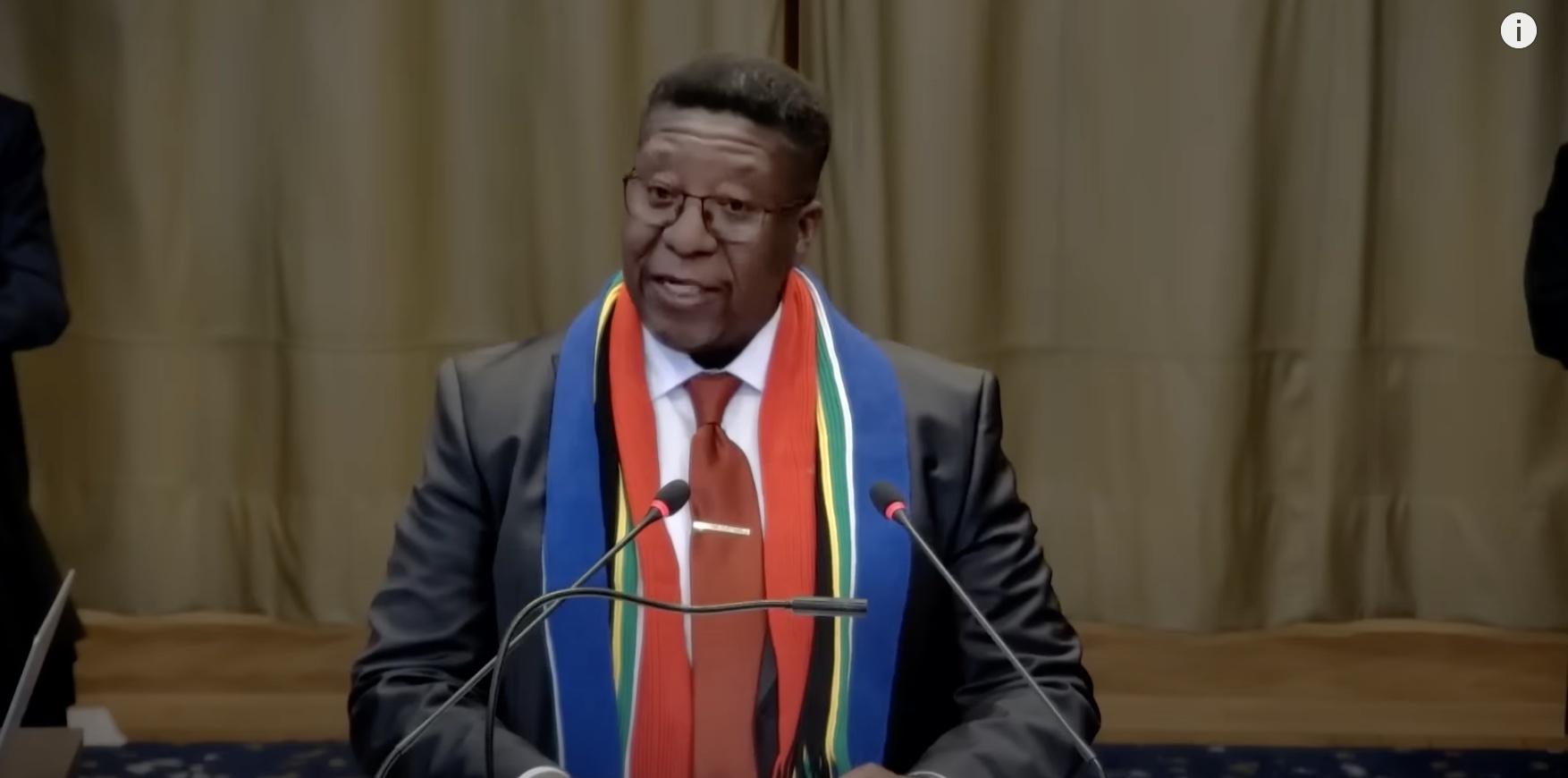
His Excellency Sir Vusimuzi Madonsela recognises Israel's colonisation of Palestine since 1948. Still from the live footage of the case, courtesy United Nations YouTube channel.
Khan’s statement appears to be a description of classic colonial exploitation and dispossession, resonant of South Africa’s recognition of the “ongoing Nakba of the Palestinian people through Israel’s colonisation since 1948,” as expressed by His Excellency Mr. Vusimuzi Madonsela. While Khan’s application to issue arrest warrants for top Israeli officials is a sign of hope, the ICC’s past provides cause for concern.
Not only are America and Israel not members of the ICC despite their intimate histories with the Nuremberg Trials, the ICC’s investigations in Afghanistan seem to uphold Du Bois’ colour line yet again. In 2021, the ICC reopened a previously suspended investigation on war crimes in Afghanistan, which had been underway for over a decade, that investigated crimes committed by all parties to the conflict. While the previous investigation was the first time the ICC probed the U.S. for war crimes, in the fresh probe, the ICC would not include conduct by the U.S. and its allies even though their crimes fall within its jurisdiction. Instead, the ICC would focus solely on crimes committed by the Taliban and the Islamic State Khorasan Province (IS-K), the decision reminiscent of the discrepancies in persecution of crimes committed by Japan and the U.S. during WWII, as seen in an analysis of the Tokyo Trial in the second part of this essay.
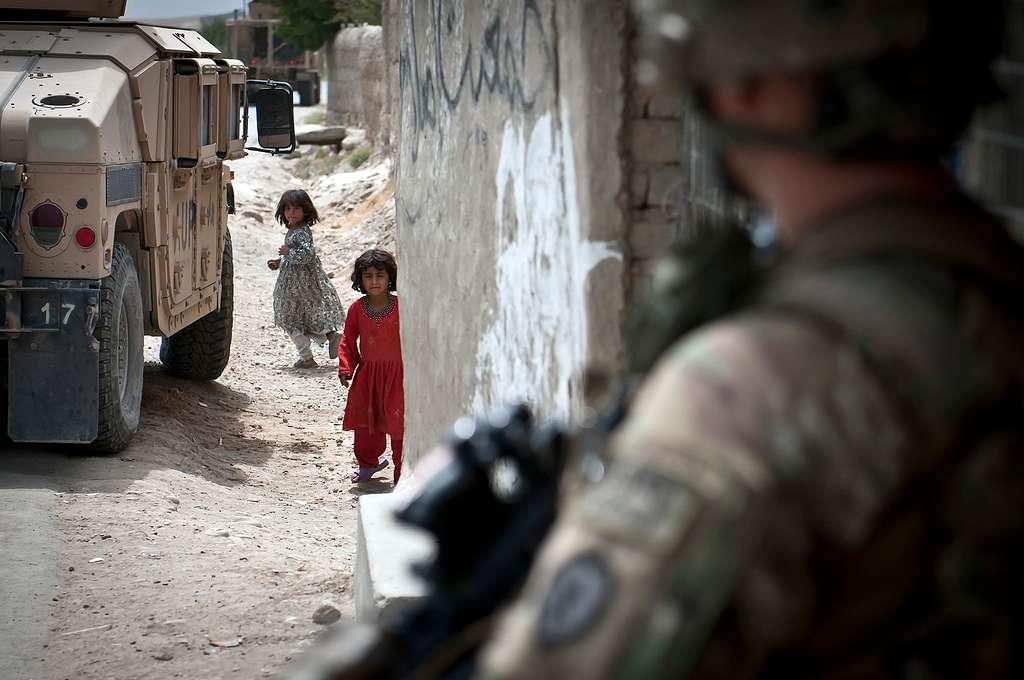
Afghan girls run to hide from U.S. Army soldier. An estimated 70,000 civilians have been killed in Afghanistan since the U.S. invasion in 2001. (Image courtesy of PICRYL.)
That the discrepancies of the past continue in the present is evidenced in the article “How the U.S. Derailed an Effort to Prosecute its Crimes in Afghanistan.” The author, Alice Speri, cites a telling complaint by the erstwhile chair of Afghanistan’s Independent Human Rights Commission, Shaharzad Akbar: “This decision reinforces the perception that these institutions set up in the West and by the West are just instruments for the West’s political agenda.”
While this statement marks a recurring return to a global colour line, South Africa’s demand for access to Gaza for reporters and war crime investigators to collect evidence of potential war crimes, as well as Khan’s application to the ICC, signal fidelity to justice. It is on the basis of this commitment that Khan’s words, “Nobody by virtue of their nationality or colour of their skin have a free pass to say the law does not apply to us…” might still hold the capacity for the universality of Nuremberg.
While the advisory ruling of the ICJ in July 2024 that Israel has no right to sovereignty in the occupied territory, has violated international law and is blocking Palestinians’ right to self-determination is a watershed moment, the non-binding nature of the ruling and persisting violence in Gaza only serves to sharpen the contours of the colour line.
What is at stake then, in the continuing impunity of Israel and its Western allies? In the words of Du Bois (1915):
“Beyond the awful sea a black woman is weeping and waiting, with her sons on her breast. What shall the end be? The world—old and fearful things, War and Wealth, Murder and Luxury? Or shall it be a new thing—a new peace and a new democracy of all races: a great humanity of equal men?”
In case you missed the previous parts of this essay, you can access the first and second parts here.
To learn more about the ‘Child of Nuremberg’ in the context of Afghanistan, read Radhika Saraf’s two-part essay on Samira Makhmalbaf’s At Five in the Afternoon (2003).




